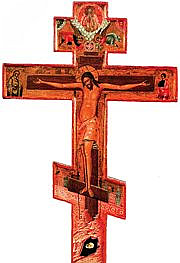Death & the Future Life: Memorial & Funeral Services

The Office at the Parting of the Soul from the Body, from the Service Book, transl. Isabel Hapgood.
Reflections on the Funeral, by Panagiotis Somalis of the Orthodox Church in Kenya. Includes a discussion of the practice of having open coffins in funerals.
Death, The Threshold to Eternal Life: An account of the approach to death, it's Christian meaning of Hope and Eternity, as well as excerpts and meaning of the Burial Service in the Eastern Orthodox church.
The Requiem Office for the Dead (Panikhidi), from the Service Book trans. by Isabel Hapgood.
Death, Funeral, Requiem—Orthodox Christian Traditions, Customs and Practice, by Rev. Victor Sokolov
A Question About Open Coffins, a Q & A from The Shepherd.
Prayers for the Reposed Non-Orthodox, a Q & A from Orthodox Tradition.
Praying for the Non-Orthodox. From Orthodox Life.
Commemoration at Proskomedia, An Instruction: by Bishop Kyrill of Seattle.
A Recipe for Koliva. This is a food mentioned in various articles on this page. It is used for Commemoration services for the dead. Phyllis Onest explains that the origin of this tradition: "On the first Saturday of the Great Fast we remember the miracle of St. Theodore of Tyre in 362 AD with koliva. The Emperor, Julian the Apostate, had the food in the market sprinkled with the blood of animals sacrificed to pagan gods in order to defile the first week of the Great Fast. Patriarch Aphdoxios of Constantinople appeared to the saint in a dream warning him of the emperor's scheme. St. Theodore told the people to cook the wheat they had at home rather than grinding all of it into flour. Thus, they did not buy anything in the market and avoided the tainted food."
O death, how bitter is the remembrance of thee to a man that liveth at rest in his possessions, unto the man that hath nothing to vex him, and that hath prosperity in all things: yea, unto him that is yet able to receive meat! O death, acceptable is thy sentence unto the needy, and unto him whose strength faileth, that is now in the last age, and is vexed with all things, and to him that despaireth, and hath lost patience! Fear not the sentence of death, remember them that have been before thee, and that come after; for this is the sentence of the Lord over all flesh. And why art thou against the pleasure of the most High?
And as it is appointed unto men once to die, but after this the Judgment... So then every one of us shall give account of himself to God.
—Wisdom of Sirach (Ecclesiasticus) 41:1-4; Hebrews 9:27; Romans 14:12
O relatives and close ones of the dead! Do for them what is needful for them and within your power. Use your money not for outward adornment of the coffin and grave, but in order to help those in need, in memory of your close ones who have died, for churches, where prayers for them are offered. Show mercy to the dead, take care of their souls. Before us all stands the same path, and how we shall then wish that we would be remembered in prayer! Let us therefore be ourselves merciful to the dead.
—Homily on Life After Death, by St. John of Shanghai and San Francisco

